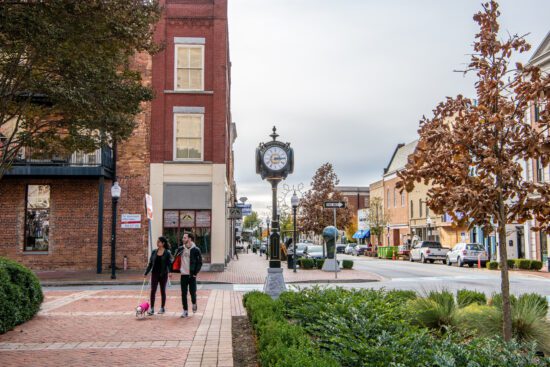College education as my generation knew it deserves to die, higher education must flourish. In four hundred years of living in the Americas no Reynolds had to go to high school let alone college to live satisfactory lives. There is vanishingly little evidence that the kind of jobs we still hold in the family, outside of my own, actually require high school or college education.
When government decided to get involved in college and university education at the end of World War II much good was done and that good has rightly been celebrated. Who has a bad word to say about the GI Bill?
I do.
In the midst of the good done by the GI Bill, scientific research funded and spreading the benefits of liberal arts education, came harm. Colleges faced explosive growth that could not be sustained in the long term, but became the “new normal.” They begin to pump out larger numbers of professors and never stopped doing so when growth slowed. In many fields, particularly the humanities, the glut cheapened the value of professors.
Colleges also began to multiply disciplines as money sloshed through the system. Undergraduates demanded greater options and program offerings and as a business colleges responded. Put simply, the more difficult the subject area is the fewer students are attracted to that field of study. Whatever the merits of the fields, less rigorous disciplines began to sprout up all over colleges unrelated to long term social needs or market demands.
College became a rite of passage for the entire middle class and as a result the social aspects of college programs exploded. Many colleges soon had more administrators and social programming workers than professors. Athletics had already become semi-professional, but this increased and soon entered other areas. The “school play” became the drama department and the school choir at even a small school aspired to Eastman School of Music quality. Professionalization led to the growth of programmed “amateur” activities.
All this cost money and was passed on to students and parents in rising tuition. Easy student loans made it possible for anyone to pay, at least for a time, and so the system has continued to this day. Every year tuition goes up and more treats are offered students to attract their dollars. This cannot go on forever, cracks already are appearing, but even if it could there was a great loss.
What got lost? Higher education.
The Roosevelt family did not send young Theodore to Harvard to get a job. The family could have found a job for him, if a job was necessary. They sent him to become a gentleman and patriot leader. A consumer centered commodity based system does not even do a good job training for jobs, but it cannot produce a lady or a gentleman.
Many, if not most jobs, Americans will do require little education beyond basic literacy and numeracy. My challenge is this: if a woman or man could read, do basic math well, and communicate fluently how many jobs could be mastered at the end of a paid apprenticeship?
All those jobs should be removed from the college curriculum in the future. College structure is an expensive, out of date, and slow way of achieving goals. In some areas, the traditional professions (medicine, ministry, law), higher education is necessary. Scientists will continue to be trained in elite communities as will the (relatively) small number of professors needed by society.
The rest of us should get on with it . . . unless there is actually more to college. By “more” I do not mean hanging out with friends, going to sports events, and meeting new people. One can do all those things at jobs while getting paid. Nor are the “life skills” learned in dorms directly applicable to “grown up” life. Never again will an American be forced to live with people they do not know in spaces they did not pick unless they end up in prison or a monastery.
The “more” in higher education should include “finding Obi-wan:” the mentor who will train leaders in higher ways of living. This cannot be done by part-time faculty underpaid and facing classes of hundreds. Jesus and Socrates modeled good mentoring by finding a small group and spending years in dialog. Leadership training can take place, and historically has taken place, in the armed forces, but college is a great peacetime option.
The “more” in higher education must provide moral training. A good school must be good, but for the last few decades schools have cooperated with moral degeneracy in sexuality and the majority encourage it. When my father went to state university in the 1950s, immorality existed, but was discouraged by officialdom. It made a difference.
The “more” in higher education must train in tastes and feelings. The heart can be educated as well as the mind. I did not come to college loving opera, but education expanded my tastes and now I can love more. A higher education also can teach me when my tastes are poor or the art I love unworthy. U2 is nostalgic to me, but I also know the limits of their musicianship, because of higher education.
The “more” in college should encourage out of the box thinking and entrepreneurial activity. Modern colleges are stagnant and view moving quickly as a ten year plan. We developed “credit hours” and “programs” when file cards and folders were the only way to track progress. This leads to individualizing curriculum while standardizing methodology, but this will never produce higher education.
Higher education individualizes methodology while making sure that there is a standard curriculum. People are individuals in learning styles, but citizenship, common culture, and truth require a body of knowledge that all leaders should know. American students should know the history of their nation, warts and all. Students should master their own and another language. This liberal arts education is for everyone who wants it and is equipped to get it.
There are too many liberal arts colleges in the United States for the number of students who are prepared to benefit from a liberal arts education. Many students have never experience mentoring in their huge centralized high schools. More than a few students are only in college to get a “good job” and to enjoy themselves. A small number are there to “find themselves” . . . college as an expensive version of the old Victorian “Grand Tour.”
There is no good reason for society to subsidize education for jobs that does not lead to jobs. There is no constitutional right for a rite of passage subsidized by the state. People should party on their own dime. Self-exploration is part of “higher education,” but should be in the hands of professors. Education is not a series of selfies, but showing students artistically rendered portraits that help them know themselves.
Oddly, schools will need more mentors and teachers to provide a higher education. Sadly, graduate school as it now exists leaves the successful graduate student looking to be paid for research in his or her field with a relatively light teaching load. Success in field is viewed as teaching fewer and fewer students on a smaller and smaller field of study.
There is a place for such research, but most students do not need it for a higher education or for a career. Nobody has shown a correlation between academic publication and success in higher education teaching.
Colleges, as my generation knew them, did good, but also less good than they might. Those schools will change or die. Research will continue. Highly technical professional training will thrive. Higher education, real liberal arts study, will also be in demand. If a higher educational institution can produce leaders who read well, write well, think well, and live well, then parents and students will come.









